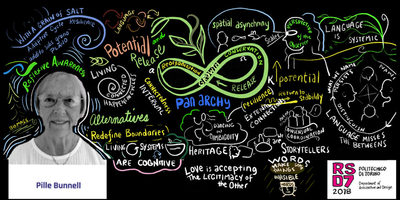With a grain of salt
Bunnell, Pille (2018) With a grain of salt. In: Proceedings of RSD7, Relating Systems Thinking and Design 7, 23-26 Oct 2018, Turin, Italy.
![Bunnell_Salt_2018.jpg [thumbnail of Bunnell_Salt_2018.jpg]](https://openresearch.ocadu.ca/2670/1.hassmallThumbnailVersion/Bunnell_Salt_2018.jpg)  Preview |
Image
Bunnell_Salt_2018.jpg Download (176kB) | Preview |
Abstract
My intent with the title is to evoke a listening through the double meaning of “salis” implicit in Pliny’s original phrase “addito salis grano.” The word “salis” not only refers salt, it also refers to wit. I am exploring the idea that acting with wit and intelligence means we should not take our models of the world too seriously. Models and frameworks enable us to make sense in the same way that a map helps us navigate, but unlike physical maps where there is a correspondence between land and notation, our conceptual territories are cultural and dynamic, so our maps (models, frameworks) should be used with a grain of salt and we should be willing to adapt them. This adaptive cognitive process is evident in the evolution of ideas related to the adaptive cycle, namely around patterns of the development and disintegration of systems.
I thus follow the evolution of some of the insights associated with the adaptive cycle. Resilient systems arise through an interplay of transformation and persistence in a shifting balance between the internal connections required for the system to be a system, and the external ones that enable it to persist in a context. As systems arise and disintegrate they do so embedded in and interacting with other dynamic systems at other spatial and temporal scales. As they intersect and interact they become a panarchy rather than a hierarchy.
As a second thread I weave in an awareness that we humans are the ones who develop the concepts that I present, (including this one about developing concepts) and that we do this through our recursive and recurrent consensual coordinations of actions and ideas in language and culture. In tracing how we may have developed ever more complex sets of distinctions and how we live these as our various realities, I note that we can easily find ourselves living in a name-based and somewhat rigid sense of reality. Thus our realities may also be seen to exist as adaptive cycles. Further, in any of these realities those regularities of experience that are not named disappear from our thinking and are very difficult to re-evoke or define in language. However, I note that our cognitive abilities are not limited to language, we also exist in an internal panarchy of relationships that resonate with the external panarchy in ways that we may become aware of as we implicitly operate in a panarchic interplay of design cycles.
I conclude the presentation with a deeply held desire. I would like us humans to remain the kind of beings who live in reflexive awareness of our systemic dynamic flow in a relational embeddedness.
| Item Type: | Conference/Workshop Item (Paper) |
|---|---|
| Date Deposited: | 19 Jun 2019 14:25 |
| Last Modified: | 02 Aug 2021 08:46 |
| URI: | https://openresearch.ocadu.ca/id/eprint/2670 |
Actions (login required)
 |
Edit View |

 Tools
Tools Tools
Tools